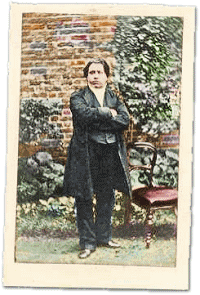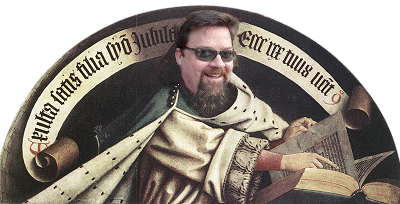Sad to say, I have the personal resumé to write an extended series of articles about depression.
In reading through Numbers, I was reminded of one potent cause of depression. (No, I don't mean that reading through Numbers causes depression.)
The nation of Israel was dallying in the desert. They were there as a penalty for their unbelief. In these wanderings, they came to Kadesh, and ran short on water (Numbers 20).
This was their reaction to the situation:
And the people quarreled with Moses and said, "Would that we had perished whenFirst, I'd observe that their concern had a basis in reality. I've lived in the desert. Water is nothing to spit at. (Pause for laughter to die down.) (Very short pause.) You just don't go anywhere without spare stores of water on-hand. And so here were hundreds of thousands of people, in the desert, and they'd come short on water. This isn't an "Oh, well, what's on TV?" situation. It is a legitimate crisis. Without water, they would die.our brothers perished before the LORD! 4 Why have you brought the assembly of the LORD into this wilderness, that we should die here, both we and our cattle? 5 And why have you made us come up out of Egypt to bring us to this evil place? It is no place for grain or figs or vines or pomegranates, and there is no water to drink" (Numbers 20:3-5)
Depression doesn't need an objective cause. M'man Spurgeon spoke of causeless depression, and I may add my own thoughts someday. Dealing with free-floating depression is like boxing a fog bank. This was not of that nature. This depression was able to fix on objective realities.
Second, their viewpoint was incomplete, and that in two specifics. Glaringly, the Israelites had forgotten why they were still in the wilderness. They were stuck in the desert because of their own unbelief. Surely you remember the story, from Numbers 13-14. In sum:
God said "Go"
They said "No"
So God said "No go"
They said "Woe!"
(Some tried...
...they died)
 So in their response here, they blame everyone — everyone, that is, except themselves. It's Moses' fault. It's Yahweh's fault (cf. 21:5). But of course the truth is that it was their fault, it was the fault of their unbelief. And so, having failed to learn from the previous lesson, they simply repeat their sin.
So in their response here, they blame everyone — everyone, that is, except themselves. It's Moses' fault. It's Yahweh's fault (cf. 21:5). But of course the truth is that it was their fault, it was the fault of their unbelief. And so, having failed to learn from the previous lesson, they simply repeat their sin.Let me underscore that point.
"For whatever was written in former days was written for our instruction," (Romans 15:4), and we mustn't miss the lesson here. Refuse to learn from discipline for sin, and you will repeat both sin AND discipline. This is why Proverbs is so full of thunderous warnings and reproofs for the man (or woman) who bull-headedly refuses to accept discipline, rebuke, correction (cf. 1:24-31; 10:17; 12:1; 15:10; 29:1, etc.).
You and I may stop our ears, stiffen our necks, harden our hearts, and turn our backs. We may even eventually forget. But God doesn't. We can be sure that it will come up again, and again, until we either address the issue or fall under it.
I think of my kids in our home school. On occasion, some kid may give me a bunch of sloppy, slapdash, thoughtless homework. I take my red pen and (as my wife says) proceed to bleed all over it. Then I lecture. Then I add some stiff penalties in terms of lost privileges and/or extra work.
And if that child then clearly seethes with anger at me, I say, "If you blame me for what just happened to you, I guarantee it will just keep happening to you, again and again. Today is a result of the decision you made yesterday. Think and do the same today, and the same (or worse) will happen tomorrow, and for the same reason."
So why were these knotheads still in the desert, in the first place? Unbelief. So how do they respond to the crisis they face, here, in-the-desert-because-of-unbelief?
With unbelief.
And in their unbelief, they had left God out of the equation. On the one hand, nobody could argue with part of their assessment of the situation. They were indeed short on water. Without water, an unpleasant death was certain. That's "dire" according to any dictionary.
But what of God? Their thinking did not include Him fully. That miscalculation, from the matrix of unbelief, was the cause and sustenance of their despair.
The essence of depression, and the unbelief that is so often at its root, is not that it is completely baseless. It may have a fragile and tenuous basis, or it may have a large and overwhelming basis. Either way, its vantage point is incomplete. It is incomplete in a way that makes it end up completely wrong.
Suppose I meet this little shrimpy old guy in an alley, and he tries to rob me. I say, "Dude, you're old, and I've got a hundred pounds on you, plus a green belt in karate. You're completely
 outmatched."
outmatched."He shrugs and says, "Except for this gun."
"Yeah, well, except for that," I reply, noting sagely that one factor can alter the entire equation.
And so Israel, never having dealt with their sin head-on, never having confronted the abhorrent and appalling nature of their unbelief head-on, and never having estimated God correctly, once again miscalculate. They leave out one crucial factor. They leave out God. And they're depressed.
And so I suggest to you that, at the root of much (not all) of our depression is a similar miscalculation.
But while we're shaking our heads at what nincompoops those dumb Israelites were, we should reflect pointedly on our own unbelief. We have one thing they didn't have. We have their story. Plus a truckload of additional revelation, including the whole New Testament.
So when our own unbelief casts us down into our own depression, let us learn from their example, that we not repeat it. Let us reach into our own coats, and pull out the precious key called Promise. Let us make it ours by faith, use it, escape from Giant Despair, and head for the joy that is our portion.


 ou know, at Phil's house, there are no turkey leftovers after Thanksgiving—but the rest of us have bird for days and days after the big binge, depending on how well (or poorly) we planned.
ou know, at Phil's house, there are no turkey leftovers after Thanksgiving—but the rest of us have bird for days and days after the big binge, depending on how well (or poorly) we planned. Anyway, I bring it up because "the religion of demons" is apparently the only very important issue regarding the "Free Grace" position which Phil did not strip to the carcass, food-process, make into a salad rich in Mayo, bake with crackers and veggies, and then boil into a lovely soup. And, as is my career at my house, I get the leftovers. I'm Dad.
Anyway, I bring it up because "the religion of demons" is apparently the only very important issue regarding the "Free Grace" position which Phil did not strip to the carcass, food-process, make into a salad rich in Mayo, bake with crackers and veggies, and then boil into a lovely soup. And, as is my career at my house, I get the leftovers. I'm Dad.



 his time tomorrow, Lord willing, I'll be in Ashford, Kent, in the south of England. That's where the offices for Grace to You Europe and The Martyn Lloyd-Jones Recordings Trust are located. I plan to do a couple of days' work in the office. Next week, we'll have a board meeting in London.
his time tomorrow, Lord willing, I'll be in Ashford, Kent, in the south of England. That's where the offices for Grace to You Europe and The Martyn Lloyd-Jones Recordings Trust are located. I plan to do a couple of days' work in the office. Next week, we'll have a board meeting in London. Incidentally, I understand that tomorrow the Pulpit blog will be posting an article by John MacArthur in which he will deal with the issues of "cultural engagement," Mark Driscoll's language, and pastors who always seem to have more to say about the latest worldly entertainments than about the means of sanctification. I expect the Pulpit blog will be getting some comments this week. I'll be sorry to miss the "conversation."
Incidentally, I understand that tomorrow the Pulpit blog will be posting an article by John MacArthur in which he will deal with the issues of "cultural engagement," Mark Driscoll's language, and pastors who always seem to have more to say about the latest worldly entertainments than about the means of sanctification. I expect the Pulpit blog will be getting some comments this week. I'll be sorry to miss the "conversation."

 his is not an earnestly doubting age; we live among a careless, frivolous race. If the doubters were honest there would be more infidel places of concourse than there are; but infidelity as an organized community does not prosper.
his is not an earnestly doubting age; we live among a careless, frivolous race. If the doubters were honest there would be more infidel places of concourse than there are; but infidelity as an organized community does not prosper.

 onday evening Darlene and I are leaving for about 10 days in England. I have lots of things to do before leaving, so I don't have time to do a proper BlogSpotting post.
onday evening Darlene and I are leaving for about 10 days in England. I have lots of things to do before leaving, so I don't have time to do a proper BlogSpotting post.
 such things deserve to die, they not only do them but give approval to those who practice them" (v. 32).
such things deserve to die, they not only do them but give approval to those who practice them" (v. 32). thankful for in this country. We owe a lot of thanks to the farmers who provide our wonderful produce like these beautiful cranberries." And we've all heard of government indoctrination centers ("public schools"), in which the children are taught that the purpose of Thanksgiving was to thank the Indians for teaching survival skills. Often enough, one sees moderating, vague statements such as "we should all be thankful," or "Americans express gratitude" -- which, if it were submitted as an essay in our
thankful for in this country. We owe a lot of thanks to the farmers who provide our wonderful produce like these beautiful cranberries." And we've all heard of government indoctrination centers ("public schools"), in which the children are taught that the purpose of Thanksgiving was to thank the Indians for teaching survival skills. Often enough, one sees moderating, vague statements such as "we should all be thankful," or "Americans express gratitude" -- which, if it were submitted as an essay in our 
 ast year,
ast year, 
 've said before
've said before As a matter of fact, my disapproval of Finneyism and my abhorrence of perfectionism are more than matched by the animus certain perfectionists have directed at me in return. One example of what I'm talking about is
As a matter of fact, my disapproval of Finneyism and my abhorrence of perfectionism are more than matched by the animus certain perfectionists have directed at me in return. One example of what I'm talking about is  college/career fellowship in which I ministered, decades ago. We called him "Motorcycle Paul." He resolutely never brought a Bible to the Bible Study. (Irony pause: 3... 2... 1....) See, Motorcycle Paul had read it—once. That did it for him. Now God spoke to him directly, and he needed no man to teach him. He had visions.
college/career fellowship in which I ministered, decades ago. We called him "Motorcycle Paul." He resolutely never brought a Bible to the Bible Study. (Irony pause: 3... 2... 1....) See, Motorcycle Paul had read it—once. That did it for him. Now God spoke to him directly, and he needed no man to teach him. He had visions. Scripture. Paul said that he could serve as the Corinthians' example (1 Corinthians 11:1), a thought he echoed elsewhere (cf. 4:16; also Philippians 3:17; 4:9; 2 Thessalonians 3:9). He enjoined his pastoral apprentices to live exemplary lives as well (1 Timothy 4:12; Titus 2:7), so that others could see their example, and gain thereby.
Scripture. Paul said that he could serve as the Corinthians' example (1 Corinthians 11:1), a thought he echoed elsewhere (cf. 4:16; also Philippians 3:17; 4:9; 2 Thessalonians 3:9). He enjoined his pastoral apprentices to live exemplary lives as well (1 Timothy 4:12; Titus 2:7), so that others could see their example, and gain thereby. he quotes Dr. So-and-such, or he plucks an allusion from the life of Pastor Thingummy. Instead of instructors and guides, these revered exemplars become
he quotes Dr. So-and-such, or he plucks an allusion from the life of Pastor Thingummy. Instead of instructors and guides, these revered exemplars become 




 n my first pastorate, I had often to battle with Antinomians,—that is, people who held that, because they believed themselves to be elect, they might live as they liked.
n my first pastorate, I had often to battle with Antinomians,—that is, people who held that, because they believed themselves to be elect, they might live as they liked.

 Of course, when it's OSU, I like to see Texas get thrashed, but that happens so rarely no one can legitimately hold it against me.
Of course, when it's OSU, I like to see Texas get thrashed, but that happens so rarely no one can legitimately hold it against me.

 ob Wilkin, founder and chief mouthpiece of the Grace Evangelical Society, published this "review" of The Gospel According to Jesus in the October-November 1988 issue of the GES newsletter, within a few weeks after the book was first released:
ob Wilkin, founder and chief mouthpiece of the Grace Evangelical Society, published this "review" of The Gospel According to Jesus in the October-November 1988 issue of the GES newsletter, within a few weeks after the book was first released: But, in an effort to keep the spam out of other comment-threads and appease the handful of people who are itching to debate the issue here, I'll open the comment-thread in this post to the discussion. I just want to make a few ground rules, which I will strictly insist on:
But, in an effort to keep the spam out of other comment-threads and appease the handful of people who are itching to debate the issue here, I'll open the comment-thread in this post to the discussion. I just want to make a few ground rules, which I will strictly insist on:








